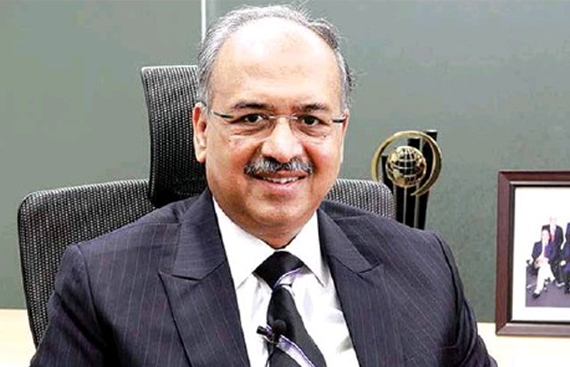Dilip Shanghvi: Sun of India's Pharma Industry

People grow up with an aim and certain ideals to aspire, pursue and achieve the goal. Though, a few people would be able to carry the zeal till their young adult age. Indeed, from dreaming to achieving the dream, the journey would be full of multiple challenges. And strong determination is the only key to succeeding in the hardships. Hence, let’s talk about one such resolute businessman, Dilip Shanghvi, founder of Sun Pharmaceutical Industries Ltd, who followed the mantra of never giving up and was rewarded with the civilian honour of the Padma Shri in 2016.
The son of a wholesale drug distributor
Dilip Shanghvi comes from a Gujarati family settled in Kolkata and he is son of a pharmaceutical distributor. He pursued a Bachelor of Commerce degree from the University of Calcutta. Sanghavi got the spark of his dream from his father’s business. It began by assisting his father, Shantilal Shanghvi, in his business of a wholesale dealership of medicines, mainly generic drugs, in Kolkata.
While distributing drugs, which were neither from big groups nor patented, Sanghavi thought to make their drug instead of selling others’ products, and it would be appreciated for their quality. Inadequate financial support or other resources could not be huddled in his way. He was passionate about charting his path and creating his own identity. Driven by this dream, he founded his own company, and it was called Sun Pharmaceutical Industries Ltd.
With some calculations, Sanghavi had his figures right on the pulse. In 1983, the 27-year-old Sanghavi borrowed around INR 10 000 from his father and opened his first manufacturing unit, Sun Pharmaceutical Industries. The unit, located in Vapi in his native state of Gujarat, a short drive away from Mumbai, produced exactly one psychiatry drug. However, the business soon picked up cherish to Sanghavi's insight and energy, and by 1997, Sun Pharma acquired Caraco Pharma, an American company.
Rise of the largest pharmaceutical firm in India
Afterward, Sanghavi has never dug into the past. Slowly but steadily, Sun Pharma has been forging ahead. Sanghavi said that in those days, Dawa Bazar was under the control of Multinationals, and only a handful of indigenous manufacturers were into pharmaceuticals. Besides, local manufacturers had yet to earn the trust of doctors and make their credibility. The Patent Act was in force only till 1970 and was abolished later. Though the processing of drugs had a patent cover, there was no patent on finished products. Hence, the opportunity came the local manufacturers’ way, though indirectly.
Consequently, the multinational firms lost interest in Indian markets. And this directly helped domestic companies. They began building capacity for making these drugs. Though the processing of drugs had a patent cover, there was no patent on finished products. Consequently, the multinational firms lost interest in Indian markets. And this directly helped domestic companies. They began building capacity for making these drugs.
Under Shanghvi's leadership, Sun Pharma persisted in expanding rapidly, acquiring more than a dozen firms and brands between 1999 and 2012. The company's 2010 acquisition of a controlling stake in Israel's Taro Pharmaceutical Industries—following a three-year takeover battle—almost instantly doubled its U.S. revenues to more than $1 billion. In 2015 Shanghvi supervised the completion of the company's $3.2 billion assets of generic-drug rival Ranbaxy Laboratories from Japan-based pharmaceutical giant Daiichi Sankyo Co. The contract made Sun Pharma the fifth-largest generic-drug producer globally and the largest pharmaceutical firm in India.
The Decisive Nineties
The name evokes enormous respect and admiration. With a market capitalization of nearly Rs 491.25 billion at present, it is the biggest pharma company in the country. While most Indian firms those days concentrated on making drugs that had a larger share in the market, Sun Pharma did not shift its priority from Psychiatry and neurology drugs. For Sun Pharma, the nineties demonstrated very decisively. By that time, the company had already made its name, but something more tangible was required to establish itself. In 1993, the company re-invested its entire profit of Rs 4 crore in setting up its own Research Center, and in the following year, the company joined the capital market with its own Public Issue.
At the time, the company’s turnover was looming between Rs 50-60 crores; after that, the company gained an average growth rate of 35% every year and catapulted to having a turnover of Rs 4000 crores. The firm extended from psychiatry drugs to include medicines for heart trouble, respiratory complications, diabetes, stomach, intestines, etc. Most of these diseases strike people at an old age, and their treatment continues for a long. Hence, the firm focuses on those drugs people have to continue taking for longer. This is what you call business astuteness to keep its customers. Sanghavi believed in the people who are experts in the pharma industry, as he doesn’t possess any official knowledge or degree in the pharma industry.
In the list published in Forbes Magazine in November 2009, Shanghvi is ranked 14th on India's list of rich people. And his $16.7 billion fortune ranks him at number 44 among the world's richest billionaires overall Forbes list, 2022. Aside from his work at Sun Pharma, Shanghvi was active as a personal investor, with interests that increasingly extended beyond pharmaceuticals, notably in the field of renewable energy. In 2018 he became a member of the Reserve Bank of India's central board.
